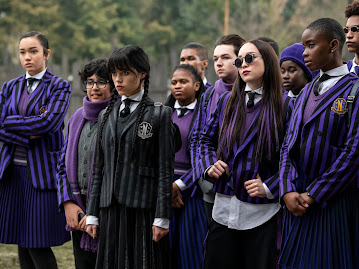Wednesday: politics for modern kids
Author's note: I do not condone the alleged actions of Wednesday actor Percy Hynes-White, including but not restricted to sexual assault, grooming and racism. I hope these issues will be resolved peacefully and fairly. This post is not interested in the private activities of Wednesday's actors, and instead very much interested in what the show, as a public piece of media, has to offer its audiences.
Wednesday: politically engaging in discussions about racism and segregation whilst telling a great story
It’s safe to say Tim Burton’s Wednesday has been a big hit with audiences of all ages. Whether you necessarily enjoyed it, or thought the show was deserving of its hype, Wednesday locates an iconic, kooky character (and family) in a modern world. Burton’s show creates a segregated society on screen and asks us to critique the systems which enforce social hierarchy. It explores the Mexican ancestry of the Addams family, connecting Wednesday with her distant relative, Goody Addams. In essence, Wednesday centralises issues of race, segregation and discrimination, and those issues inform rather than detract from the narrative.
 |
| Wednesday and Goody Addams; two sides of the same coin. |
For starters, the big change which sets the narrative of the show in motion is Wednesday’s move to Nevermore Academy - a school specifically for “outcasts” like herself and her family. The labels of “outcast” versus “normie” are present and powerful from the outset of the show, and they do have segregationist connotations. And as uncomfortable as that might make us, it’s a truth of Wednesday's social structures: the “outcasts” reside in Nevermore Academy - away from the local town of Jericho - and interactions between “outcasts” and “normies” are strained, tense or uneasy; there is always a sense of distance and difference.
However, with Wednesday Addams as the eponymous heroine, the audience’s eyes are her eyes - critical, calculating, suspicious, but also the eyes of a young person who does not fit in. This feeling might be more familiar to some audience members than others, but the point is, her eyes have power. Wednesday’s eyes have power because they grant us access to her world, in Nevermore Academy, in Jericho, and even across time.
We see the interweaving of narrative with modern socio-political issues in Wednesday’s systematic approach to her investigations. The same ruthless drive to prove Rowan was murdered can be seen in her attack on Joseph Crackstone’s legacy in Jericho (although credit goes to Thing for, ahem, getting his hand dirty). Wednesday’s character does not change to tackle these issues, so they are presented through Wednesday as being equally significant, equally worthy of her investigative energy.
I’m willing to argue Burton’s series does a good job of representing those socio-political tensions without taking interest away from the principal characters and their stories. Moments of socio-political reflection are embedded in the structure of relationships in the series, hence why they are convincing: they cannot, ultimately, be denied, even if they're sometimes overlooked in favour of new developments in the plot.
Modern audiences are critically aware of the importance of representation on screen, so the social tensions presented in the show might be seen simply as the producers and writers inserting representation for the sake of political correctness, but this does not line up with the way that socio-political issues are integrated into the narrative thread of the show. Politics in Wednesday is not performative but instead forms the narrative conceit.
Why is this important? It demonstrates how it’s very much possible to create a series which is fun and kid-friendly whilst also being sensitive to modern socio-political issues, and actively engaging with those subjects. Rowan’s murder and Crackstone’s legacy are inextricable, and demonstrates this connection between fictional narrative and modern sensitivity which Wednesday achieves.
The aim is not necessarily to change the fabric of modern politics and society with a single Netflix show (although that seems strangely possible in the modern world). But, by creating art which engages with issues of, in this case social division and discrimination, perhaps the world stands a better chance of sorting out its issues.

Comments
Post a Comment